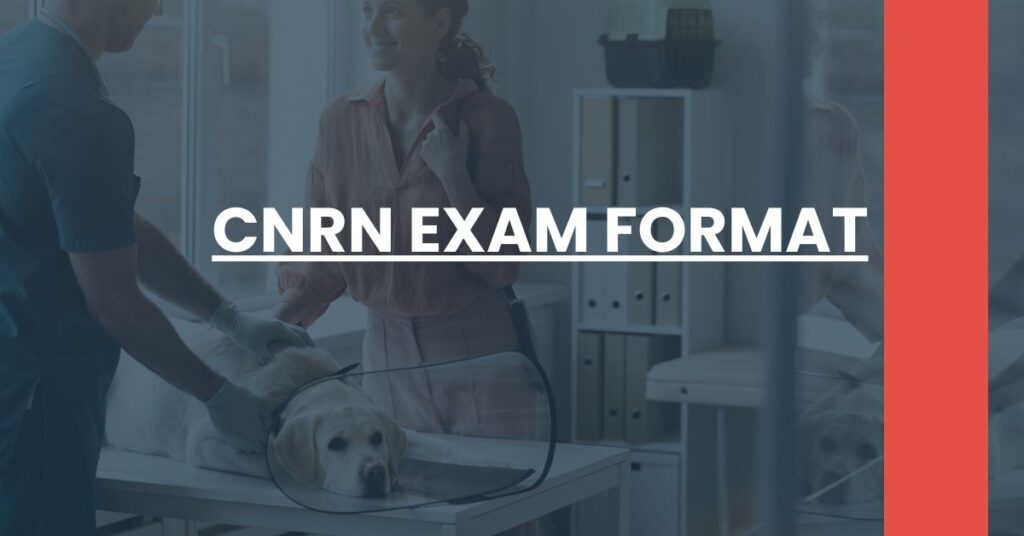Understanding the CNRN exam format is crucial for your preparation and success.
- Assessment Structure: The CNRN exam encompasses a comprehensive range of neuroscience nursing topics.
- Question Style: Experience various types of questions, including multiple-choice and scenario-based queries.
- Timing and Pacing: Learn about the time allotment and how to manage it effectively during the exam.
Grasp the complete CNRN exam format for optimal readiness.
CNRN Exam Eligibility Criteria
To become a Certified Neuroscience Registered Nurse (CNRN), nurses must fulfill specific criteria that validate their expertise and dedication to neuroscience nursing.
Nursing Licensure and Professional Experience
Candidates must hold a current, unrestricted RN license. This licensure must be valid not just at the time of application but through the date of the examination.
Professional Roles and Pathways to Eligibility
The certification is not just for those directly caring for patients. Consultants, researchers, administrators, or educators in neuroscience nursing can also pursue a CNRN credential, provided they have an active RN license. These roles expand the scope of influence these professionals have in improving neurological care, making their expertise vital to the field.
Candidates can refer to the 2024 CNRN Candidate Handbook for a detailed overview of all eligibility requirements.
Additional Documentation
This may include detailed descriptions of their roles, educational credentials, or more nuanced aspects of their licensure. Adhering to these requirements is essential for maintaining the integrity and standard of the CNRN certification.
CNRN Exam Registration Process
The journey to becoming a Certified Neuroscience Registered Nurse includes a series of administrative steps that candidates must carefully navigate. This begins with registering for the CNRN exam, an essential step toward certification.
Application Submission and Deadlines
To register, applicants must complete the following steps:
- Visit the American Board of Neuroscience Nursing (ABNN) certification website to access the certification application.
- Fill out the application form with great attention to detail to ensure accuracy.
- Submit the application along with the required fee before the deadline of the desired exam date.It’s important to keep in mind that there are specific dates and deadlines for the exam which are listed on the ABNN website.
Examination Fees
The cost of the CNRN exam application varies depending on membership status with the American Association of Neuroscience Nurses (AANN):
- AANN Members: $300 by credit card ($325 if paid by check)
- Non-Members: $400 by credit card ($425 if paid by check)
Remember, these fees are non-refundable, and it’s pivotal to ensure your eligibility before applying.
Scheduling the Examination
Once your application is approved, you will receive instructions on how to schedule your exam.
To avoid any inconvenience, it’s advisable to schedule the exam as soon as possible after receiving approval, as test center availability can vary.
It’s also worth noting that the ABNN processes applications on a rolling basis, which can be a major advantage for candidates eager to secure their preferred test date and location.
For further details and assistance during the registration process, candidates can access the ABNN certification website or contact Candidate Services at 1-800-367-1565 Ext 6750 or email at [email protected].
Scoring the CNRN Exam
Understanding how the Certified Neuroscience Registered Nurse (CNRN) exam is scored is a crucial element in a candidate’s preparation. It allows you to set benchmarks and understand exactly what is required to succeed.
Exam Composition and Passing Score
The CNRN exam is composed of 220 multiple-choice questions, but only 200 of these are scored. The remaining 20 questions are pretest items used to gather statistical information for future exams.
Scoring Methodology
The scoring process is based on a criterion-referenced method.
This method involves a group of subject-matter experts who evaluate each question’s difficulty and determine the passing standard.
For statistics on pass rates and other data, candidates may refer to the Comprehensive CNRN Examination Statistics.
After the Exam: Score Reporting and Retake Policy
After completing the exam, candidates will receive a score report that indicates whether they passed or failed. The official results are typically available immediately upon completion.
- For unsuccessful attempts, the CNRN exam has a retake policy. Candidates who do not pass can reapply to take the exam during the next scheduled testing period. However, it is advisable to spend additional time preparing to ensure a better outcome on the next attempt.
- For successful candidates, the passing score verifies the specialty knowledge and should be a point of pride as it exemplifies a commitment to excellence in neuroscience nursing.
After the Exam: Certification and Recertification
Achieving a passing score on the CNRN exam is just the beginning.
Obtaining Certification
After successfully passing the CNRN exam, candidates earn the prestigious CNRN credential.
Maintaining Certification
The CNRN certification is valid for five years. Maintenance of the certification reflects the nurse’s commitment to lifelong learning and continued competency in providing care to neuroscience patients.
The Recertification Process
As advancements continue to shape the landscape of neuroscience nursing, CNRNs are required to recertify to ensure they remain current in their specialty. Recertification can be attained in one of two ways:
- Passing the CNRN Examination Again: This route validates that your knowledge and skills are up-to-date with current practices and emerging developments.
Frequently Asked Questions (FAQs) About the CNRN Exam
Nerves and questions are a natural aspect of the CNRN certification journey. The FAQs section provides succinct, helpful responses to common queries.
Exam Details and Preparation
- How Many Questions are on the Exam?
- How is the Passing Score Determined?
- What is the Best Way to Prepare for the Exam?
Retake Policies and Results
- How Soon Will I Know My Results?
- What if I Need to Retake the Exam?
Accommodations and Assistance
- Are There Accommodations Available for Disabilities?
- Where Can I Get Additional Help or Information?

